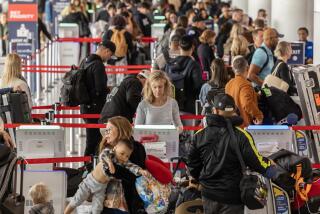Pump Prices Starting to Ease
- Share via
Driven lower by falling oil prices and shrinking demand, the nationwide average price for gasoline dipped below $3 a gallon on Monday for the first time since reaching record highs after Hurricane Katrina.
The cost of self-serve regular gasoline fell to an average $2.955 a gallon Monday, down 11.4 cents from $3.069 a week earlier, according to a weekly survey by the Energy Department.
In California, the per-gallon average dropped 5.2 cents to $3.004.
Analysts expect gasoline prices to continue to fall in coming days in response to a steady decline in the cost of crude oil and signs that high prices have blunted demand. On Monday, the price of benchmark U.S. light, sweet crude for October delivery closed at a five-week low of $63.34 a barrel, down 74 cents on the New York Mercantile Exchange.
Futures prices for gasoline, heating oil and natural gas closed lower on the Nymex on Monday.
“This next week is going to have one of the biggest dips in retail prices ever,” said Tom Kloza, chief oil analyst at the Oil Price Information Service, a trade publication that tracks petroleum prices. He predicted a reduction of about 15 cents a gallon over 10 days, but added, “It’ll be mostly east of the Rockies, because that’s where we had the biggest spike.”
Kloza and others noted that gasoline demand had fallen more than usual since Labor Day, a sign that record pump prices were prompting motorists to curtail fuel use.
Even with prices starting to ease at the pump, the effects of sustained high oil prices continue to ripple through industry.
On Monday, DuPont Co. said it would raise prices on 35,000 products -- including plastics, chemicals and seeds -- to offset the cost of petroleum. Many of the company’s products are derived from raw crude oil, and its factories use large amounts of natural gas and other fuels to power equipment. Celanese Corp. of Houston, a leading supplier of chemicals used in resins and plastics as well as water treatment and sweeteners, also announced price increases.
Most of the airline industry, meanwhile, continues to falter, hit hard by losses that carriers blame in part on the cost of jet fuel. On Monday, amid reports that Delta Air Lines would soon seek Bankruptcy Court protection, the International Air Transport Assn. said high fuel prices would boost the industry’s 2005 losses to $7.4 billion worldwide, 23% more than expected.
In the Katrina-ravaged states of Louisiana and Mississippi, four refineries remained idle Monday, representing about 5% of the nation’s capacity to convert oil into gasoline, diesel, jet fuel and other products, according to the Energy Department.
Retail gasoline prices leaped 40 cents a gallon or more in many parts of the country after the hurricane slammed into Gulf Coast states Aug. 29, upending oil rigs and damaging refineries and pipelines that supply gasoline and diesel to markets as distant as New York and Michigan.
The price increases were less severe in California, in part because of its dependence on specialty fuel made by in-state refineries that were unaffected by the storm. On several days in the last two weeks, gasoline cost more elsewhere than in California, long home to the most expensive fuel in the continental U.S.
California remains vulnerable to further price shocks. The statewide average price for diesel, for example, was the highest in the country Monday at $3.318 a gallon, AAA reported.
In addition, state energy officials warned last week that Katrina had strained supplies of a key chemical used in California’s summertime gasoline blend and could further boost retail prices here without quick relief.
To head off the expected ripple effect, California regulators Friday approved an emergency measure to relax emission standards and switch to wintertime fuel blends more than a month early. The change, which gained official clearance Monday, means that refiners will need less of the affected additive.
Also Monday, a vast power outage in Southern California halted production at refineries owned by Shell Oil Co., ConocoPhillips and Valero Energy Corp. Refineries can be damaged if they are unexpectedly shut down and can take several days to resume full production.
Valero said late Monday that its Wilmington plant was not damaged and that it should be back at full operations within two days. Conditions at the other refineries were unknown.
The wholesale price of gasoline in Los Angeles shot upward in reaction to the outages, keeping prices high despite the declines on the New York market, said Kloza of the oil pricing service.
“The market spiked about 8 cents a gallon when it heard of the power outages affecting the Wilmington refineries,” he said. “It’s probably a good sign that it didn’t keep going up.”
Bloomberg News was used in compiling this report.
More to Read
Inside the business of entertainment
The Wide Shot brings you news, analysis and insights on everything from streaming wars to production — and what it all means for the future.
You may occasionally receive promotional content from the Los Angeles Times.










